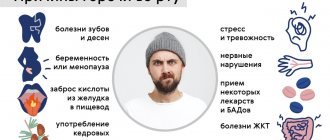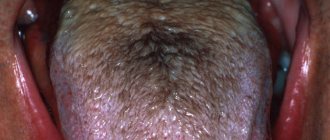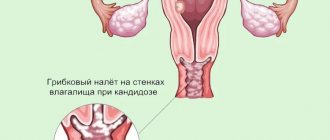Dry mouth is an unpleasant sensation that can be a symptom of serious illnesses. If dry mouth occurs constantly or frequently, it is necessary to understand the cause that is causing it and, if necessary, begin treatment. Elimination of dry mouth, as a rule, is achieved only as a result of treating the underlying disease, which should be the true goal. In any case, the feeling of dry mouth is another reason to pay attention to your health.
Dry mouth is caused by insufficient hydration of the oral mucosa, mostly due to insufficient saliva production. In medicine, dry mouth caused by a cessation or decrease in saliva production is called xerostomia.
.
Quite often, dry mouth occurs in the morning or at night (that is, after sleep).
Symptoms associated with dry mouth
Dry mouth in most cases manifests itself as a complex of symptoms described as:
- "viscosity" or "stickiness" in the mouth;
- thirst;
- irritation of the oral mucosa (burning and itching), the appearance of a bright border of the lips, cracks on the lips and in the corners of the mouth;
- dry tongue. The tongue turns red and becomes rough. It becomes more difficult to speak, chew and swallow. Decreased taste perception;
- dry throat. The voice becomes hoarse and more hoarse;
- there is an unpleasant odor from the mouth.
Treatment
The course of treatment is always individual, it depends on the causes of the disease and the characteristics of your body.
In cases where xerostomia is caused by a malfunction of the salivary glands, the doctor may prescribe a special massage that improves blood flow and restores fluid production. A more serious problem is blockage of the channels that remove saliva. In this case, you will need to clean them under local anesthesia. If the blockage is caused by a stone, surgical intervention is needed.
If the cause of xerostomia is an allergy or a side effect of drugs, what caused the reaction is excluded, and the drugs are replaced. The patient is advised to add vegetable oils to his food, drink vitamins and eat more fish.
If erosion or cracks have already appeared on the mucous membrane, they must be treated with special disinfectants. Rinsing with herbal decoctions also helps, but never with salt.
Sources:
- Clinical studies of antisensitive toothpaste “Asepta Sensitive” (A.A. Leontyev, O.V. Kalinina, S.B. Ulitovsky) A.A. LEONTIEV, dentist O.V. KALININA, dentist S.B. ULITOVSKY, Doctor of Medical Sciences, Prof. Department of Therapeutic Dentistry, St. Petersburg State Medical University named after. acad. I.P. Pavlova
- Prevention of recurrence of localized periodontitis in young A.K. YORDANISHVILI, Doctor of Medical Sciences, Professor, North-Western State Medical University named after. I.I. Mechnikov, Military Medical Academy named after. CM. Kirov, International Academy of Sciences of Ecology, Human Safety and Nature.
- Study of the clinical effectiveness of treatment and prophylactic agents of the Asepta line in the treatment of inflammatory periodontal diseases (A.I. Grudyanov, I.Yu. Aleksandrovskaya, V.Yu. Korzunina) A.I. GRUDYANOV, Doctor of Medical Sciences, Prof., Head of Department I.Yu. ALEXANDROVSKAYA, Ph.D. V.Yu. KORZUNINA, asp. Department of Periodontology, Central Research Institute of Dentistry and Maxillofacial Surgery, Rosmedtekhnologii, Moscow
- putrid odor from the mouth is a direct consequence of the intensive proliferation of bacteria;
- burning tongue - it appears with fungal diseases of the oral cavity;
- pimples and dry lips are formed due to a lack of vitamins in the body.
Causes of dry mouth that are not pathological
In some cases, dry mouth is not associated with a medical condition. For example:
- Dry mouth can occur in the morning and at night due to intoxication. This is a typical situation after drinking too much the night before.
- When nasal breathing is impaired, a person breathes through his mouth during sleep. The mouth is slightly open, and the oral mucosa dries out faster. Nasal breathing can be impaired due to a runny nose, nasal polyps, or a deviated nasal septum. A similar situation occurs with snoring. The cause of snoring in most cases is a decrease in the tone of the soft palate. Muscle weakening develops with age. This is why older people snore more often, and their oral mucosa becomes dry. This reason explains dry mouth in the morning in the elderly in most cases.
- If you don't drink enough fluids in hot weather, you shouldn't be surprised by dry mouth. A similar effect can be caused by eating highly salted foods.
- Many medications can cause dry mouth.
- Smoking is another common cause of dry mouth.
- Dry mouth can be one of the symptoms of menopause.
Pathogenesis
The female body responds to most adverse conditions by changing the balance of hormones. This is especially noticeable during adolescence, during pregnancy or menopause. But sometimes, due to chronic pathologies, the endocrine glands and organs of the reproductive system produce secretory fluid unevenly.
If estrogen levels drop, biochemical, histological and functional changes begin in the urethra and vagina. The hormone is responsible for the production of collagen, which is involved in maintaining sufficient quality of vaginal tissue. If there is not enough of it, the stratified epithelium becomes thinner, smaller, and less elastic.
Diseases that may cause dry mouth
Dry mouth can be caused by high fever and intoxication due to various infectious diseases (flu, sore throat, etc.). Diseases associated with large loss of fluid as a result of vomiting or diarrhea (cholera, dysentery) can also cause dry mouth. In such cases, dry mouth is one of many symptoms and does not attract special attention.
If dry mouth is combined with diarrhea, flatulence, belching, nausea and pain in the left side of the abdomen, then this may indicate pancreatitis.
Dry mouth in combination with a bitter taste, heartburn, white or yellow coating on the tongue can indicate diseases of the gastrointestinal tract such as gastritis, duodenitis, cholecystitis.
Dry mouth can also occur with:
- diseases of the salivary glands;
- endocrine diseases (diabetes mellitus, thyrotoxicosis);
- neoplasms of the oral cavity (benign and malignant);
- damage to nerve endings that contribute to the functioning of the salivary glands;
- anemia;
- vitamin A deficiency;
- systemic diseases (scleroderma, Sjogren's disease, cystic fibrosis).
Causes
It is worth noting! During the period of bearing a child, young mothers often experience a restructuring of all their vital functions.
First of all, to ensure the vital functions of two organisms, a larger volume of blood, a special level of hormones, an increased amount of water and nutrients, as well as proper rest are needed.
Therefore,
if something is not performed to the required degree or is overloaded physically or emotionally, then such an imbalance causes various symptoms, including dry mouth .
Most often, dry mouth during pregnancy occurs due to:
- Eating hot , spicy, pickled, smoked, salty foods, carbonated drinks and natural coffee .
- Changes in mineral balance, most often excess magnesium and deficiency of potassium . With the help of a special diet enriched with tomatoes, potatoes, zucchini, dried apricots and other products, you can restore the required level of minerals.
- Some medications have a feeling of thirst as a side effect . Therefore, you need to either replace the drug or abandon it. If the harm from excluding treatment is greater than discomfort, it is necessary to obtain competent advice from a doctor.
- Diseases of the circulatory or nervous system, respiratory tract.
- Dehydration as a result of toxicosis or a shift in water balance. If drinking water or non-carbonated drinks is not possible, then dehydration through a dropper is necessary.
- Diseases of the endocrine system appear quite often and are associated with changes as a result of pregnancy. Therefore, to determine this factor as the main cause of dry mouth, you need to do a blood test for TSH levels.
- Diabetes in pregnant women appears due to a change in the balance in metabolic processes and hormonal functions. The symptom can pose a significant danger to the fetus and the woman. Therefore, the GTT test is performed primarily to exclude gestational diabetes.
Eliminate dry mouth
If dry mouth is caused by drinking alcohol and smoking, then it can only be eliminated by getting rid of the bad habit. It is recommended to reduce the consumption of salty and sweet foods. Pay attention to how you breathe - through your nose or mouth. If nasal breathing is difficult, the cause must be diagnosed and nasal breathing restored. To do this, you will have to see a doctor. It is also important to monitor the humidity in the room.
Dry mouth can be the first symptom of many diseases. Therefore, if you often experience a feeling of dry mouth, it is necessary to understand its nature, determine the cause and, if necessary, consult a doctor and begin treatment for the disease that caused this symptom.
How to keep your teeth and gums healthy during pregnancy?
When planning a pregnancy, it is very important to prepare the oral cavity and carry out a complete sanitation. However, if after pregnancy there are still teeth that require treatment, they definitely need to be cured! During pregnancy, teeth can not only be treated, but also necessary! You need to warn the dentist that you are expecting a child, then he will select a safe anesthetic with less adrenaline. It is advisable to carry out dental treatment from the second trimester of pregnancy, but if necessary, it can be done in the first if there is a risk of complications. Starting from the 20th week, you can carry out x-ray diagnostics of teeth using the latest methods of computer visiography, which are absolutely safe for both the expectant mother and the child.
If we talk about prevention, the most important aspect for maintaining a healthy oral cavity is proper nutrition (reducing carbohydrate intake, introducing calcium-rich foods into the diet), taking vitamin and mineral complexes prescribed by a gynecologist.
And, of course, proper dental care. Complete hygiene includes brushing your teeth 2 times a day in the morning and in the evening after meals. The use of additional hygiene products in the form of dental floss, interdental brushes, tongue scraper and anti-inflammatory elixirs. Please note that all hygiene products are selected for you by your dentist INDIVIDUALLY!
It is necessary to visit the dentist every 3 months for a follow-up examination and remineralization therapy. Remineralizing therapy involves artificially impregnating dental tissues with the necessary mineral components that are so necessary during pregnancy. Also, if necessary, professional oral hygiene is carried out (once every six months). It includes removing tartar and plaque using ultrasound and an Air Flow device, and thoroughly polishing the surface of the teeth using professional pastes.
All materials used are absolutely harmless to both the woman and the baby. After professional hygiene, the surface of the teeth is covered with a special remineralizing composition. Conducting remineralization therapy once every 3 months and daily proper dental care will help you maintain healthy teeth and gums during pregnancy.
Which doctor should I contact for dry mouth?
If you complain of dry mouth, you can contact your dentist or general practitioner (GP or family doctor). After identifying the cause that caused the feeling of dryness, you may be redirected to an endocrinologist, gastroenterologist or rheumatologist.
Most likely, you will need to undergo various tests (general blood count, general urinalysis, blood test for thyroid hormones, biochemical blood test, serological test), and, if necessary, undergo some instrumental studies (ultrasound, radiography, computed tomography).







